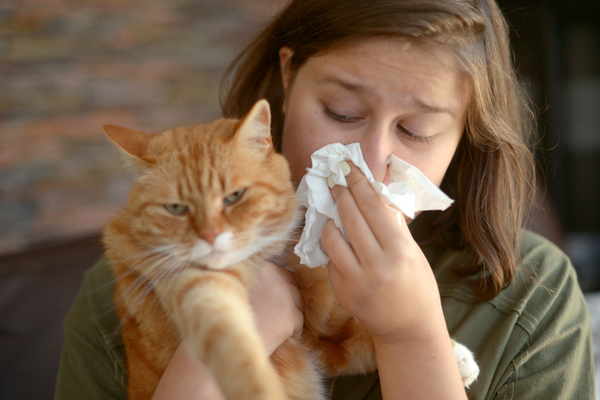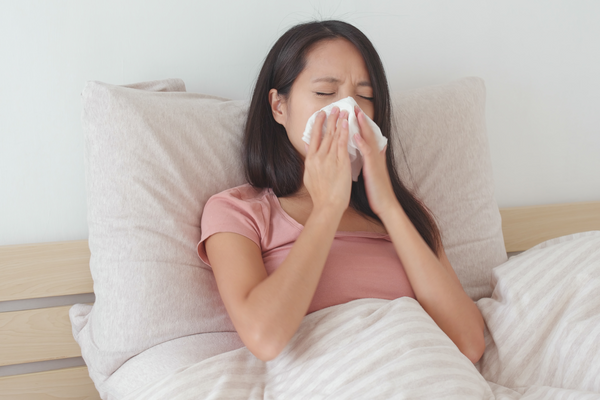Banish Indoor Air Allergens This Spring

As winter comes to a close and warmer days approach, it's time to start preparing for your deep spring clean. Unfortunately, during colder months, it's easier for allergens such as pet dander, dust mites, mold spores, and other particles to accumulate in your home – leading to poor indoor air quality and allergy symptoms. In this blog post, we'll explore common indoor allergens, how they affect human health, and the best strategies for removing them from your living space - so that you can look forward to better air quality and relief from uncomfortable allergy symptoms. Get ready to breathe easy with a thorough spring clean!
What Triggers Allergies Indoors?
Indoor allergens are small invisible particles found in the air, on furniture, walls, and other surfaces that can cause respiratory symptoms such as sneezing, coughing, and runny nose. The most common indoor allergens are dust mites, mold spores, dog and cat dander, and cockroaches.
Dust mites are the leading cause of in-home allergies. According to the American Lung Association, chronic, ongoing exposure to dust mites at home can dramatically impact the health of people with asthma and those who are allergic or particularly sensitive to mites.
Related: Are Your Allergies Worse Indoors? A Complete Guide to a Healthier Indoor Environment
How Can You Reduce Allergens in Your Home?
Getting a handle on indoor allergens can reduce (or even eliminate) allergy symptoms. Here’s a step-by-step plan to set you up for allergen-busting success this spring and beyond.
1. Create Your Spring Cleaning Kit
These supplies will cover most surfaces in your home and make spring cleaning a breeze:
- Anti-Allergen Solution
- Hypoallergenic Multi-Purpose Cleaner
- Anti-Allergen Laundry Detergent
- Dust Mite Control Spray
- Cleaning Cloths
- HEPA Vacuum
PRO TIP: Choose Your Cleaners Wisely
According to the EPA, many conventional cleaning products contain harsh ingredients. Not to mention, many harsh chemicals (like bleach and ammonia), when mixed, can be downright dangerous. Small children and pets are especially vulnerable to the effects of harsh chemicals due to higher exposure levels because of their size. Plus, household cleaning supplies are among the top five substances accounting for Poison Control Center calls.
Cleaning products formulated with harsh chemical ingredients can harm your health, especially for the vulnerable. People with asthma and allergies are particularly susceptible to the effects of harsh chemicals found in conventional cleaning products. These chemicals can cause a range of health issues and aggravate existing symptoms, such as wheezing, chest tightness, and sneezing. Therefore, those with asthma, allergies, and other respiratory conditions must take extra care when choosing their household cleaning products. On top of that, considering that many of the harmful chemicals in conventional household products are often carcinogens, neurotoxins, or endocrine disruptors, it’s worth swapping them in favor of gentler cleaning products. And what better time than spring?
At The Ecology Works, we understand your needs and offer gentler alternatives to harsh chemical cleaners. We believe everyone has the right to a healthy home environment – which is why we strive to provide gentler alternatives you can trust. All of our household products are free from the following:
- Volatile Organic Compounds (VOCs)
- Bleach
- Ammonia
- Synthetic Dyes
- Perfumes and Synthetic Fragrances
- Phthalates
- PFAS (the “Forever Chemicals”)
- Caustic Chemicals
- Optical Brighteners
2. Declutter Before You Clean
Springtime is perfect for decluttering. Not only does a tidy home look inviting and make you feel better, but it also helps keep allergens and irritants at bay. Did you know that the average American household accumulates about 40 pounds of dust yearly? Decluttering before you begin your spring cleaning can help eliminate the dust and the allergens it contains more quickly and easily. With just a few hours spent sorting, organizing, and tossing items no longer needed or used, you will have an easier time tackling the rest of your cleaning tasks.
3. Dust & Vacuum
Kick off your spring cleaning in one area of your home, the living room, for instance. Start by thoroughly vacuuming walls, upholstery, floors, and all the nooks and crannies. For best results, make two or three passes with your vacuum. Now’s a great time to give your ceiling fans a good cleaning, too.
Next, tackle dust. Wipe down walls, bookshelves, windowsills, tables, and other surfaces with a microfiber cloth dampened with Anti-Allergen Solution to neutralize allergens on contact.
PRO-TIP: Discourage Dust Mites
Keeping the relative humidity levels below 50% will help prevent dust mites. To reduce dust mite allergens in your home, vacuum carpets and upholstery. After you vacuum, use DustmiteX on carpets, upholstery, pillows, and mattresses to eliminate dust mites.
4. Refresh Bedding & Other Fabrics
Regularly refreshing bedding and other fabrics in your home helps to reduce the levels of common indoor allergens such as dust mites, pet dander, mold, and mildew. Washing these items in a gentle, fragrance-free Anti-Allergen Laundry Detergent can give them a thorough clean and leave them feeling fresher.
Strip the beds down to their bare essentials - mattresses and bed frames - before you start washing pillowcases, sheets, duvets, and comforters. Next, wash items like bed pillows, throw pillows, and washable rugs. For items that can’t be easily tossed into the washer, for example, curtains, vacuum thoroughly and spray liberally with Anti-Allergen Solution, making sure to allow drying time. Finish off your springtime refresher by arranging everything back nicely.
PRO TIP: Check the Labels
Before tossing anything into the washer, check the care direction labels for the manufacturer's instructions. If the label says it’s okay to machine-wash and dry, be sure to follow any specific instructions, such as using cold water or drying on low heat. Some materials, like wool or silk, can be damaged in the washer or dryer, so if the label says “Dry Clean Only,” it’s usually best to let the professionals handle things.
Happy Spring Cleaning! The Ecology Works provides eco-friendly solutions for dealing with indoor allergens. If you have any questions about cleaning or reducing indoor allergens, please don't hesitate to Contact Us today!




